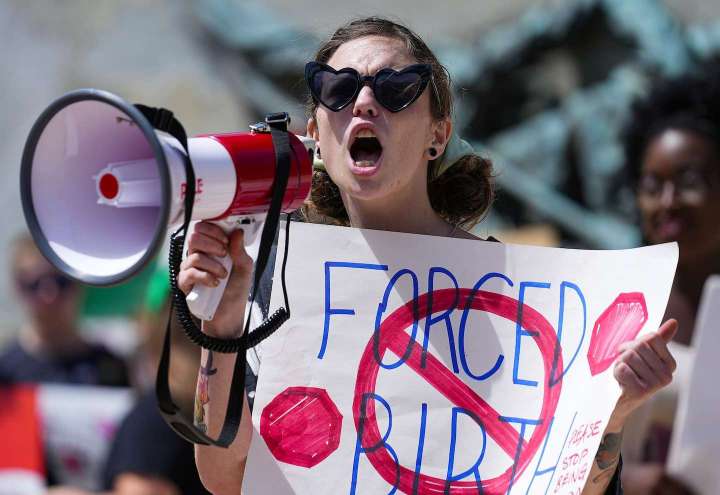The choice was between cruel and crueler. Cruel won, barely.
Indiana’s cruel abortion bill is a warning of post-Roe reality

Welcome to the new abortion debate, in which no restriction short of an absolute, unyielding ban will satisfy some abortion opponents. So much for the gauzy vision of a European-style consensus in which states would make abortion freely available up to a certain point in pregnancy, say 15 weeks, the limit imposed by the Mississippi law that the Supreme Court’s conservative majority used in Dobbs v. Jackson Women’s Health Organization as a vehicle for eliminating abortion rights. The legislative landscape is still unfolding, but the new reality is that abortion is likely to be prohibited or unavailable after the first few weeks of pregnancy in almost half the states.
Indiana is one of the first to consider abortion legislation in the aftermath of the Supreme Court’s vote to overturn Roe v. Wade, so the fate of the measure that passed Saturday is instructive. Republicans enjoy a comfortable supermajority in the state legislature, with 39 of 50 Senate seats. But Indiana Republicans were a party divided — 18 voted to eliminate the exceptions for rape and incest — and ultimately just 26 voted for final passage. Now the measure heads to the Republican-dominated House, which has a chance to make it even worse.
To some extent, antiabortion forces are like the dog that caught the car — after all these years of cost-free railing against Roe, they are in the uncomfortable position of having to make real-world, and politically dicey, choices about what restrictions to impose in its absence.
So is it good news that the most extreme forces didn’t prevail — at least for now? Or is it bad news that what they deemed unacceptable is itself so extreme? Yes and yes, but count me more worried than relieved. The debate in Indiana shows why.
Follow Ruth Marcus‘s opinions
FollowThe bill would make abortion illegal in almost all cases. It carves out an exception for cases of rape and incest — but even then only up to eight weeks of pregnancy, 12 weeks if the victim is under 16. How generous.
Another is if the pregnancy would result in “substantial permanent impairment of the life of the mother.” Do you know what that means? Me neither — and neither will a doctor, facing the possibility of felony charges carrying a sentence of up to six years in prison. Who’s going to risk performing an abortion under these circumstances, unless the risk of maternal death is undeniable?
So you might have thought that antiabortion activists would be delighted with this measure. Not even close. Carol Tobias, president of the National Right to Life Committee, decried it as “a wolf in sheep’s clothing designed to expand abortion on demand in the state of Indiana.”
Expanding abortion on demand? This is ridiculous on its face. Under Indiana’s existing law, women can obtain abortions at up to 22 weeks of pregnancy. Any women, with no need to demonstrate “substantial permanent impairment” of anything. Including their autonomy.
The measure got tougher and tougher as it made its way through the legislative process — just not tough enough for some. An analysis by Indiana lawyer James Bopp Jr., the longtime general counsel of the National Right to Life Committee, cited the problem posed by “the refusal of radical Democrat Prosecutors … to prosecute illegal abortions under any new Indiana abortion law.” So lawmakers added a provision allowing the state attorney general to bring cases where local prosecutors refuse. Not good enough.
The measure required that those seeking abortions because of rape or incest file affidavits, signed “under the penalties of perjury,” attesting to what happened. “This results in a huge loophole where any woman or girl could easily falsely claim rape or incest with the result of abortion on demand throughout pregnancy,” Bopp warned.
So lawmakers added a provision requiring that the affidavits be notarized. No dice. Antiabortion activists insisted that the rape had to be reported to authorities — otherwise, lawmakers would be “denying women the help they need,” according to a statement by Indiana Right to Life President Mike Fichter. As if women can’t decide for themselves whether they want to report a rape. As if they’re all a bunch of liars whose loose morality got them into this predicament in the first place.
This is what is deemed inadequate. “We did not wait 50 years for the full reversal of Roe vs. Wade for this,” Fichter said.
Believe him. The antiabortion movement persisted for a half-century in fighting Roe. It secured the elimination of an established constitutional right. It will keep going, I fear, until it achieves the ultimate objective: a nationwide ban.
“We won’t stop at Roe,” protesters chanted in Indiana as the measure was debated. Trust them: They won’t. Be warned. Be prepared.






